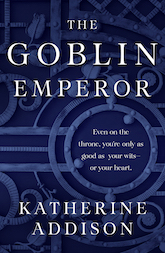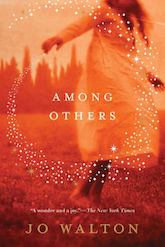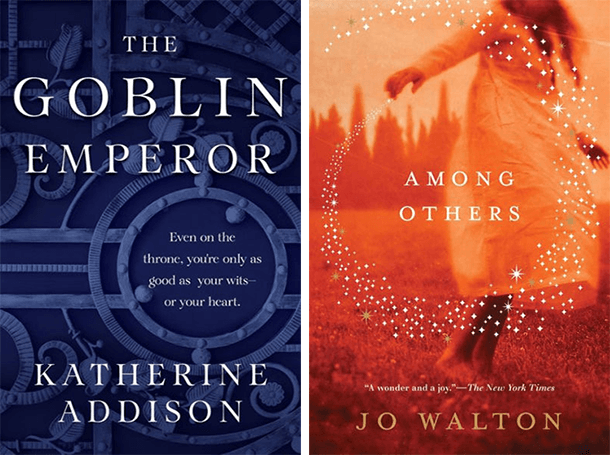In The Goblin Emperor an airship explodes, killing the emperor and his three eldest sons. We later learn that this was not an accident, but the work of assassins. Later still, we learn that those assassins have been apprehended. Why am I telling you all of this? Doesn’t this ruin the book?
Not remotely, because the book isn’t about any of that. All of those action scenes, the scenes that would be in the trailer for Goblin Emperor: The Movie, happen off-page. Rather than showing us action sequences we’ve seen a thousand times, the book spends its time dealing honestly with aftermaths. As I read it I was reminded of another book that, on the surface, is quite different: Jo Walton’s Hugo-winning Among Others.
When the twins Morwenna and Morganna engage in magical battle with their mother, a witch who wants to destroy the world. It works, but at a heavy price: Morgana is killed, Morwenna severely injured, in what the straight world thinks was a tragic accident. When the story picks up Morwenna is being packed off to boarding school, where no one will know she ever had a sister, or care that she’s in mourning, or believe that she saved the world.
The more I thought about these two books the more I saw how unique they were in their approach to storytelling. Rather than a typical quest arc, or bildungsroman, or boarding school tale, or even picaresque, what struck me about both books is that they center trauma and grief as their true subjects. Each novel mines the inner life of an introvert who has been forced into a terrible situation, and then each protagonist is given the page space to quietly, honestly, process their trauma and begin to recover.
In each book, a few things seem off as we meet our protagonists. In Among Others, we are immediately centered in Mori’s pain, both physical and emotional:
I just stood there in front of the cold fireplace, looking up under my fringe and leaning on my cane. That was something else they didn’t want to see. I saw pity in one of their faces when I first got out of the car. I hate that. I’d have liked to sit down, but I wasn’t going to say so. I can stand up much better now. I will get better, whatever the doctors said. I want to run so much sometimes my body aches with longing more than the pain from my leg.
So many tiny details are perfect here. Of course the fireplace is cold—if a fire was roaring away it would ease the pain in her leg. Of course her new guardians, two somber aunts, the elder sisters of her mother’s estranged husband, pity her, but they don’t empathize with her enough to offer her a seat, they leave her standing so she’ll have to ask for one. Which of course she won’t do. And of course her pain and longing to run are only shadows of her grief for her sister, but even she can’t look at that directly. At least not yet.
Buy the Book


The Goblin Emperor
In The Goblin Emperor, the very first thing we’re aware of is Maia’s bad relationship with his cousin/guardian, Setheris:
Maia woke with his cousin’s cold fingers digging into his shoulder.
“Cousin? What…” he sat up, rubbing at his eyes with one hand. “What time is it?”
“Get up!” Setheris snarled. “Hurry!”
Obediently, Maia crawled out of bed, clumsy and sleep-sodden. “What’s toward? Is there a fire?”
“Get thy clothes on.” Setheris shoved yesterday’s clothes at him. Maia dropped them, fumbling with the strings of his nightshirt, and Setheris hissed with exasperation as he bent to pick them up. “A messenger from the court. That’s what’s toward.”
“A message from my father?”
“Is’t not what I said? Merciful Goddess, boy, canst do nothing for thyself? Here!” He jerked the nightshirt off, caring neither for the knotted strings nor for Maia’s ears, and shoved his clothes at him again.
“Digging.” “Snarled.” “Hissed.” “Jerked.” “Shoved.” All that’s happening here is that a boy is being woken up by his cousin, and yet we can see Maia, sleepy and frightened, being bullied by this angry, violent man. It’s only in the next paragraphs that we learn that Maia is 18, the son of an Emperor, and a page later that we learn that Maia himself has just inherited the throne. But we don’t meet him as an Emperor, we meet him as a frightened, cowed boy, and a picture gradually unfolds: left alone after the death of his beloved mother, his father the Emperor chose to appoint Setheris his unwanted son’s guardian as a punishment, exiling both of them to an abandoned hunting lodge in a swamp.
But unlike a typical scenario where the abused child, raised to sudden wealth or power, is able to make new friends and gorge himself on food, Addison is careful to show how past abuse can compromise the present. Maia can’t relax into a Hogwarts Great Hall-style feast because, having only known plain food, he literally doesn’t know his own taste. He can’t enjoy a new life of music, pageantry, or balls because he’s never heard music, he’s never been taught how to dance, and he can’t even make the most basic dinner party conversation with his courtiers. Having been raised in a life defined by necessities, by a man who hated him, he can’t unclench his defenses long enough to enjoy his new life—and as Emperor, he can’t make himself vulnerable by asking for help.
Addison also makes the vital choice to show the reader how the abuser compromises the mind of the abused—Maia’s internal monologue is often undercut and mocked and sometimes snapped to attention by another voice: the voice of Setheris, which Maia has internalized so much it’s become almost a shadow. Nearly 200 pages into the book, Maia finally grants his cousin a meeting after repeatedly avoiding him. Rather than simply describing the meeting, Addison goes into Maia’s mind: “…reflexively he read Setheris’ gestures, like a man reading a coded message to which he has memorized the key…despairingly he thought, ‘I shall never known anyone as well as I know Setheris.’”
As Maia gains some power and authority, and begins to settle into his new role, that terrible internal voice sometimes comes out, and Maia listens to himself in horror as his abuser’s words and tone come out of his own mouth. Maia “despairs of himself” when this happens, but he still acts like an utter shit every few pages…because he’s only been emperor, and free of his cousin’s abuse, for about six weeks.
That’s what becomes clear as the story unfolds: the gap between who Maia is in his mind, who he wants to be – generous, compassionate, kind—and the way he often initially lashes out in frustration, misunderstands social cues, and assumes the worst in people. He was gaslit for over a decade, and that isn’t going to be undone in a month, or two months. Maia’s going to be working on himself for years before he’s able to look back and see how far he’s come.
In much the same way, Among Others uses its structure to tell a shadow story of Mori’s recovery. Walton’s story unfolds as a series of dated diary entries, so we know that the book’s prologue shows us a healthy and comparatively happy pair of twins in 1975, before skipping up to 1976 and reintroducing us to an older, shattered Mori, alone and furious. The entries cover the first three years of Mori’s new life, from 1976 until 1980, and the thing that comes through constantly is pain.
Among Others could have been a book about a girl fighting her evil mother with magic, and it could have been a standard, “nerdy girl finds unlikely friendships at boarding school”-type story. Instead, it’s about pain. It’s about what constant physical pain does to the human mind, and how to build up defenses against it.
Buy the Book


Among Others
Mori is in pain all the time. Her leg hurts, and that pain reminds her that her sister is gone and her mother is still out there, wanting to hurt her again. She needs her cane all the time, which means that while all the other girls throw themselves into athletics, she’s left on the sidelines, never quite a member of any group. As the book goes on, we see that even with the cane Mori can’t walk well. She begins to take trips into town to go to the town’s library (which has more SFF on offer than the school’s), and then later to meet up with a sci-fi book club—the unlikely friendships she finds adjacent to boarding school. But just like working magic, her attempts at connection come with a price. She needs to stop and rest constantly, and is confronted over and over again with the fact that, however well-meaning, able-bodied people simply don’t get it. They don’t know to walk slowly, they don’t know to avoid bumpy sidewalks, they don’t understand how terrifying wet roads and ice and hills can be. They don’t realize that just because you’re okay one day, that doesn’t mean you’re going to be okay the next. Much as Maia’s life will be bound by the memory of abuse, Mori’s is bound by her new reality of pain, and how she has to accommodate it.
This leads to a necessary question. I’ve said that these books are about recovery from trauma—but the lives I’ve outlined here seem pretty bleak. How can anyone get over a decade of pain? How can a teen girl work through the loss of her twin? Something I didn’t notice until I was writing this piece is that even their recovery processes are similar. In both cases, the two draw strength from rich inner lives, and the ability to be quiet and still—an ability that those around them pointedly lack. In the end, it’s these inner lives that define their characters.
Mori is trapped in a boarding school where she shares bedrooms, bathrooms, dining rooms, everything with a group of pretty, sporty girls who detest her. Maia, as Emperor, is essentially public property. He is watched and guarded at all times, washed and dressed by servants, attended even in bathrooms, and ruefully begins to wonder if he’ll be afforded privacy on his wedding night.
But in the midst of this, both characters find a way to claw some of their individuality back. For Mori, the retreat lies in getting extra library time, where she’s able to sit, surrounded by books, and lose herself in fictional worlds. I already mentioned that this is a healing process for her, but it’s also a way for her to get her mind back, to assert who she is by sitting in quiet and allowing herself to think rather than simply react to the chaos around her:
Then yesterday I found the library. I’ve got permission to spend time here when I’m supposed to be on the playing field. Suddenly, being crippled starts to feel like a benefit. It’s not a wonderful library, but it’s so much better than nothing that I’m not complaining. I’ve finished all the books my father lent me…[I]t’s wood-panelled and the chairs are old cracked leather.. So far it seems deserted by everyone except me and the librarian, Miss Carroll, to whom I am unfailingly polite.
Where Mori’s escape is literary, Maia’s is religious. Where most of his Elven subjects are rational and agnostic, Maia holds on to his mother’s Goblin beliefs. This throughline is celebrated in a scene that I think of as the key to the book: before inauguration, all emperors have to fast, descend to an underground chapel wearing only a simple gown, and spend a long shadowy night in silence. They can drink icy spring water from a fountain carved into the living rock of the chapel wall, but other than that, it’s just them, the dark, and their minds. The elven court upholds this tradition purely because its tradition, not because they believe in its spiritual significance—but Maia doesn’t just excel at this challenge, it may be the most comfortable he feels in the entire book. Having been raised by his Goblin mother to meditate and commune with several goddesses, this lonely night is the first time he feels a true connection to his heritage, and to the divine that he actually believes in. Addison takes time to hold us in the chapel with Maia, creating such a striking scene that when, several hundred pages later, Maia demands the right to meditate, I felt the release of the tension that she’d introduced the night before his coronation and touched on throughout the book.
Addison checks in with this repeatedly, showing that Maia frets over his inability to meditate. He occasionally prays himself to sleep, silently, and after a coup attempt he realizes he’s folding his hands together in a goblin meditation technique in order to marshal his thoughts. Finally, in the penultimate chapter, one of the Elven religious leaders promises to find Maia a chaplain—someone who knows Goblin traditions well enough to continue the instruction that ended with his mother’s death. For the first time Maia feels that he might have a private chapel and even a spiritual counselor, and this in some ways is the turning point that helps him feel that he’s fit to be Emperor.
Mori’s arc of pain comes to a head in a choice she’s given. Where in another kind of book she might be able to use magic to heal herself, here is gives her a much starker choice: she can leave the living world for the realm of fairies, or she can continue to live, knowing that the pain may never stop. In a mirror of the book’s opening scene, she stumbles across the hills debating the fairies’ offer, wanting to run but not being able to, wanting to lash out at her mother but not wanting to become a monster. A book that could have just been a boarding school story has become a true bildungsroman, as Mori has to decide who she is, and who she wants to become.
These two novels show a different path for fantasy writing than the usual quest or heist tale. Instead they focus on tiny, quiet pockets of time—moments spent with a book, or in meditation—and look at how those moments can ripple out into a personality. They give us two very different characters who are, in the end, defined by their desire for quiet and stillness, defined by their own choices rather than the violence that was done to them. Rather than following their expected paths to become Vengeful Emperor or Murderous Witch, they draw on their inner lives to grow into real complex adults, and use their experience of trauma to embrace lives of empathy.










